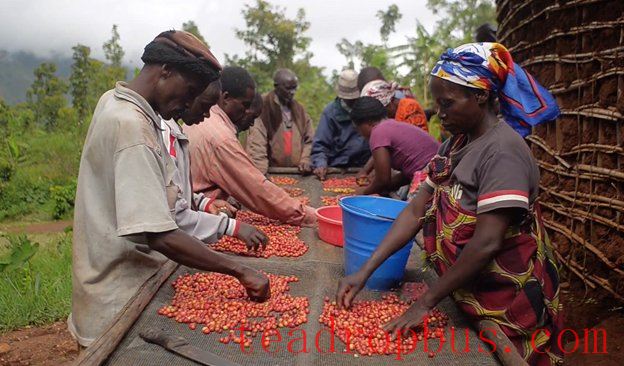
Civil war and rampant coffee smuggling prevent the Democratic Republic of Congo from taking its rightful place as one of Africa’s top exporting countries. Photo credit: Common Fund for Commodities
Despite increased production outputs and acreage under cultivation, green coffee exports from the Democratic Republic of Congo (DRC) declined in 2023 as the country grappled with an escalating civil war that has devastated coffee-growing areas.
The Food and Agriculture Organization (FAO) reports DRC’s export volumes decreased from 10,424 tons in 2022 to 7,380 tons in 2023, a trend also noted in the value of the country’s exported coffee from $30 million to $29.9 million according to FAO.
More than seven million people, many from coffee-producing areas such as Ituri and North and South Kivu, have been displaced by the civil war. This situation has exacerbated coffee smuggling by the DRC’s more than 15,000 coffee producers, the majority of whom cultivate an estimated 1.5 hectares, into Uganda and Rwanda to evade the impact of the collapsing normal coffee marketing channels.
However, between 2019 and 2023, green coffee production in the DRC increased from 52,940 tonnes to 62,217 tonnes, a surge equivalent to nearly 18%, according to FAOSTAT. More than 70% of this coffee is smuggled into Uganda or Rwanda, where it fetches better prices, “making it difficult to really understand how much coffee DRC produces each year,” states a spokesperson from Westrock Coffee, a player in the DRC coffee sector.
Currently, Olam International’s Virunga Coffee is the largest coffee exporter in the DRC, with more than 54% of the export market. It is closely followed by SCAK, a coffee exporter based in North Kivu, with slightly more than 21% of the export market share.
Both arabica and robusta are cultivated on an accumulated acreage of 157,940 hectares, an expansion from the 134,000 hectares in 2019. Arabica is prominent in the eastern highlands and lower lakesides of North Kivu, the northern lakeside of South Kivu, and the eastern part of Ituri province. Robusta, especially the Petit Kwilu variety, is grown in the western region.
International organizations and companies have contributed to increased coffee output and acreage under coffee in the DRC. For instance, USAID, through its USAID Invest, previously unveiled a 5-year plan to support key coffee value chain actors, including cooperatives, processors, and exporters, by developing their operating capacity and helping the companies raise capital.
The initiative, which will be implemented between 2021 and 2026, also included “planning for investor due diligence, reviewing business plan and pitch materials, and structuring deals using an array of financing mechanisms.”
“USAID Invest has also provided support to social impact funds by linking the financiers to eligible coffee businesses that need investment to grow,” according to a previous report by USAID.
Elsewhere, Nestle Nespresso SA has recently invested $20 million in coffee purchases, price premiums, technical assistance, and helping DRC coffee growers around the Kivu coffee production region access the global market.
Nespresso has been implementing its Reviving Origins program in the country with an estimated real GDP of $154 billion, enabling the farmers to continue producing "the exquisite coffees from the Lake Kivu region, where the once-thriving coffee farming community has been, and still is, devastated by decades of political and economic instability that continue to rise today.”
"Kivu has the potential to be among the world's great coffee regions but has faced extremely challenging conditions in recent years,” said Nespresso’s CEO, Guillaume Le Cunff.
Elsewhere, Belgium’s agricultural development organization, Rikolto, has helped DRC coffee farmers establish quality arabica coffee processing cooperatives and facilitate access to international coffee buyers amid “serious difficulties, caused by climate change and low prices on the world market.”
The company has been working with some of DRC’s 21 coffee cooperatives, such as Kawa Kabuya, SCPNCK, Kawa Maber, and Kawa Kanzururu, to increase quality international sales, boost farmers’ earnings, and catalyze a surge in coffee production.
The National Office of Agricultural Products of Congo, which provides technical assistance and extension services to coffee farmers, and the National Investment Promotion Agency, which supports local value chain actors engaged in coffee exportation, oversee coffee production in the DRC, a country with a coffee per capita consumption of 0.13kg.
Although many producers, processors, roasters, and retailers are interested in increasing the country's share in the competitive global specialty coffee market and growing DRC’s domestic coffee consumption, the ongoing civil war has displaced millions of coffee farmers. Political stability and personal safety must be established before coffee growers can leave refugee camps to return to their farms and help the country’s coffee sector realize its true potential.